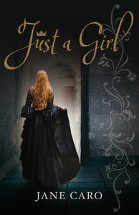Just a Girl by Jane Caro

University of Quensland Press, 2011. ISBN 9780702238802.
(Ages 11+) Historical. Highly recommended. Elizabeth, daughter of Ann
Boleyn and Henry V111, sits in the Tower of London on the eve of her
coronation and recalls her turbulent life. Caro is able to tell her
story simply but is also able to include the reader in the terrible
intrigue and power struggles that were the hallmarks of the Tudor
dynasty.
The major players in this struggle are very familiar to an older
audience, but not so to the younger readership and Caro is able to
introduce the characters without a hint of condesention. We are able to
understand the underlying reasons behind behaviors, though they seem
outragous to us now. The desire to have an heir to safely and smoothly
continue the government and dynasty of the Tudors is uppermost in
Henry's mind and it is this which puts his children in conflict with
one another as well as their father.
Elizabeth's relationship with her father is explained in a way which
gives insight to the behaviors of both. Her relationship with her
sister Mary Tudor is as unpredictable as any of those at court who may
be in favour at one time but will find themselves in the Tower the
next. Elizabeth learns quickly not to trust anyone completely and
decides, according to Caro, that she will not marry. She is wary of the
great families who would try to use her to gain power, as they did with
her cousin Lady Jane Grey. She is also welll aware of the perils that
marriage brings. Any future husband would use her postion to gain power
for himself and establish a dynasty for his own family. Elizabeth has
also seen the dangers inherent in childbirth especially with the
example of Jane Seymour.
Elizabeth came to understand the problems that occured when the
succession to the throne was disputed or subject to regency, such as
that of her young half brother Edward V1. She could also see the
problem from the other side, where the succession was crystal clear and
gave the plotters and power seekers someone to focus their attention on.
Caro certainly leaves no question that Elizabeth was lucky to inheret
the throne. Her times in and out of favour; labelled as a bastard,
imprisoned in the Tower or Woodstock, or at court having to watch every
word and action in case it gave courtiers or the monarch reason to
doubt her loyalty, would have broken most in her position. Just a Girl
is a very readable historical fiction even though you know the
outcomes. We are given an insight into Elizabeth that provides empathy
and understanding.
Mark Knight